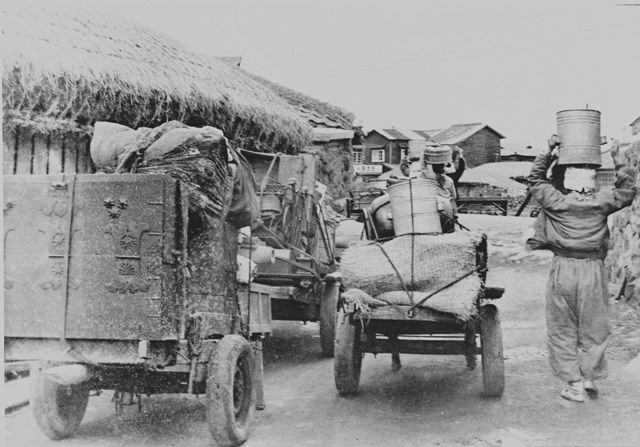| |
 |
|
| ▲ Moving house. Photo courtesy Jeju City |
There is a special custom in the beginning of the year only exist in Jeju. It is called Singugan. It starts five days after the Daehan (The Greatest Cold, 대한) and three days before Ipchun (Beginning of the spring, 입춘).
The date of Singugan changes every year based on the Chinese lunar calendar. In 2018, Singugan will fall between Jan. 25 and Feb. 1.
During the Singugan period, people on Jeju tend to move, clean, decorate or repair their house. It is worth noting that this period only takes place on Jeju, not throughout the rest of Korea.
There is no clear explanation about how this custom began. However, it is thought that Jeju’s unique myths are one of the reasons why this phenomenon only exists in Jeju.
Shingugan and Jeju's 18,000 gods.
According to traditional belief, Jeju is watched over by around 18,000 gods. These gods spend most of the year watching over life on Jeju and administering worldly affairs.
However, at the start of the Shingugan period, these gods return to heaven to report on the things that happened during the year to the Great Jade Emperor.
Once these gods have returned, the emperor will appoint new gods to take the place of the old gods to protect humans and administer affairs in the new year.
However, it takes time for the new gods to arrive on earth. This leaves a period of time on earth when the old gods have left and the new ones are yet to arrive. This period is called Singugan. In fact, Shingugan literally means between the new and old (Shin=new, Gu=old).
During this period, when the gods have left the human world, people can do things they would not normally not do out of fear of upsetting the gods.
People on Jeju believe the houses are governed by gods and that if they attempted to decorate, repair or move house outside the Singugan period, misfortune will happen to their whole family.
However, inside the Shingugan period, there are no gods on earth to upset and as such changes can be made without upsetting the gods!
Of course, people have to make sure that any changes are made before the end of the Shingugan period.
Could there also be a scientific reason?
While this is a commonly accepted view of why Shinguagn exists, according to some there may also be a scientific reason why Jeju has this special custom.
In research done by Jeju University professor Yoon Yong-tae, he pointed out that Shingugan is at the coldest time of year and therefore exposes people moving home to minimal infectious pathogens.
This could have been particularly important in the past when people and livestock lived - and moved - in close proximity. The taboo against moving in hotter and stickier months, therefore, seems to preserve this knowledge within an indigenous cultural narrative.
Basically, during this period, rebuilding toilets and repairing houses will be less likely to cause infection and disease.
Of course, nowadays there are very few people on Jeju who believe in the myths of Shinguagn. Likewise, not many people live with livestock so the idea of exposing minimal pathogens is no longer a good reason.
However, the custom still strongly remains in Jeju and because of Singugan, many houses are available for lease during this period.
For people moving, there are both benefits and downsides to moving during the most popular time of the year.
Since lots of people are moving, the moving fee can be more expensive than it would be at other times of year and it can be hard to book a moving company. Therefore, if you want to move house during the Singugan period, it is best to make an appointment early and schedule it with the moving company.
However, on the other side of the coin, for those looking for a bargain, many stores have sales on electrical or household products.
|




















